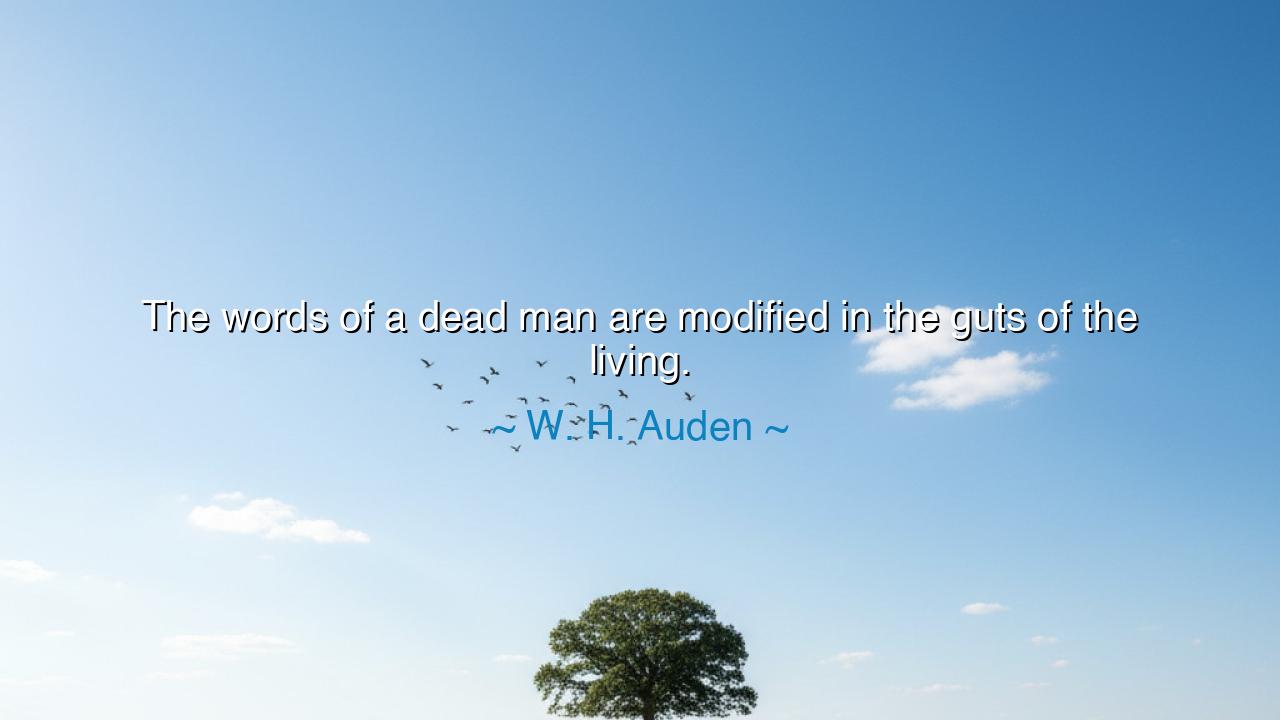
The words of a dead man are modified in the guts of the living.






The poet W. H. Auden, in his elegy In Memory of W. B. Yeats, wrote the haunting words: “The words of a dead man are modified in the guts of the living.” This line, born from mourning and reflection, carries the wisdom of ages—it speaks of how the voice of the departed never truly dies, but is transformed within the living who remember them. Auden knew that every poet, prophet, or teacher leaves behind more than mere ink upon paper. Their words are seeds, and once sown, they take root in the hearts of men—growing, twisting, and blossoming in new forms. In the end, what we inherit from the dead is not a relic, but a living flame, shaped by our breath and blood.
In this saying, Auden reveals the sacred bond between memory and transformation. When a man dies, his speech ceases, yet his meaning continues to evolve, reshaped by the minds of those who survive him. The “guts of the living” is not a crude image, but a profound one—it is the inner world, the seat of emotion and instinct, where the truths of others are digested, reinterpreted, and reborn. The dead may speak no more, but the living become their echoes, and through those echoes, their wisdom endures. Yet, Auden also warns us: no legacy remains untouched. Time and emotion reshape every message. What was once spoken in clarity may return in distortion, magnified by love or shadowed by guilt. Thus, every age rewrites the dead.
The origin of this quote lies in grief itself. Auden wrote it upon the death of William Butler Yeats, the Irish poet whose words had stirred nations and souls alike. In death, Yeats became more than a man; he became a myth, his poetry no longer his own but part of humanity’s collective spirit. Auden watched this transformation and recognized its duality: the honor and the danger of remembrance. Yeats’s words, once bound by his own meaning, now lived anew in the imaginations of others—his message alive, yet changed. Thus, Auden’s line became both a tribute and a meditation: that language outlives the speaker, but never in the same form.
History gives us many such transformations. Consider Socrates, whose thoughts survive through the writings of Plato. The master himself left no text; his ideas came to us filtered through another mind. Yet in that act of transmission, his words were modified—not betrayed, but reborn. Through Plato, Socrates became both immortal and transformed, his teachings refined by time and by another’s insight. Or think of Jesus of Nazareth, whose parables were spoken in the dust of Judea and later interpreted, translated, and reshaped by centuries of believers. His message of love and redemption endures, yet it has been reimagined countless times by the living who carry it forward. Thus, the truth of Auden’s observation stands eternal: that every word spoken by the dead lives anew in the hearts and tongues of those who follow.
There is, in Auden’s wisdom, a deep tenderness. For he does not lament this transformation—he accepts it as the rhythm of human continuity. Every generation must wrestle with the voices of those who came before, not to preserve them in perfect stillness, but to let them breathe again in the present. The guts of the living become the crucible of evolution—where art, philosophy, and faith are continually reborn. The dead give us form; the living give it movement. The world, then, is an unending conversation between what was and what is becoming.
Yet there is also a solemn responsibility within these words. To inherit the words of the dead is not to repeat them blindly, but to engage them truthfully. The living must be honest interpreters, not careless editors of the past. When we twist the voices of those who came before to justify our desires or excuses, we do not honor them—we betray them. But when we study, reflect, and act in sincerity, their wisdom gains new life through our deeds. Every teacher, artist, or martyr depends on the integrity of those who remember. Thus, we must become guardians of meaning, not prisoners of it—allowing it to grow, yet not to decay.
So, my child, take this teaching to heart: what you read, you carry; what you carry, you transform. The poets and sages who came before you speak still, but through your heart their tone will change. Do not fear this—embrace it with reverence. When you quote the wise, let their words stir your spirit, but let your own experience refine them. In this way, you become part of the great chain of memory that links the living to the dead.
For the words of the dead do not perish—they are digested by time, reshaped by love, and reborn through every soul that dares to listen. You, too, will one day speak your final words, and they, too, will be transformed in the guts of the living. Let that truth guide you to speak only what is worth remembering—and to live so that when others carry your words forward, they will find in them not confusion, but courage, not sorrow, but light.






AAdministratorAdministrator
Welcome, honored guests. Please leave a comment, we will respond soon